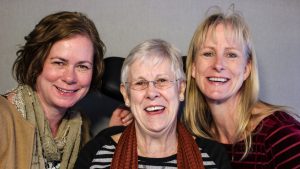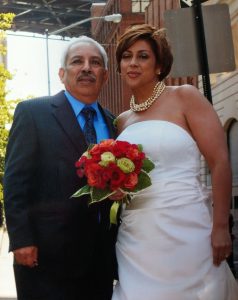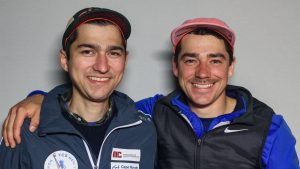<AD>
<THEME MUSIC>
Jasmyn Morris (JM): It’s the StoryCorps podcast from NPR. I’m your host Jasmyn Morris. This week stories about saying goodbye to the people who matter most in our lives.
In times like this… when a loved one is near death… we might search for the right words for an impossible situation… reflect on grief and loss… But at StoryCorps… what’s clear to us after listening to hundreds of recordings like the ones you’re about to hear… is that at the end… rather than death… people want to talk about life.
And so in this episode… wisdom from people who are navigating some of the toughest conversations of all.
First we’ll hear from 73-year-old Patricia Mishler… who moved to the United States from England in the late 70s with her two daughters… Suzanne and Janette.
In 2014 Patricia was diagnosed with ALS… also known as Lou Gehrig’s Disease… which eventually leads to paralysis.
Over a year after she was diagnosed… Suzanne and Janette brought their mother to a StoryCorps booth to ask her about living with this disease… and what it’s like knowing that it will one day take her life.
Suzanne Lynch (SL): So mom, how do you understand ALS? What is that illness?
Patricia Mishler (PM): Well the first thing about it is it’s terminal. Most doctors will tell you three to ten years but nobody really knows. And so, it’s a mourning process; you mourn the things you can no longer do. Mostly, I like to do things with my hands and this disease took my hands first. So something like gardening, I can’t do that anymore. And that is the most frustrating thing–you lose the ability to do the things that you love best.
Janette Lynch (JL): Do you look at your life differently now than before you were diagnosed?
PM: Oh, most definitely. You see yourself decline–I can hardly feed myself–and the things you thought were so important, (laughs) not as important as you thought they were. I mean, having you two was probably the most important thing I did in my life. I was so proud of having a child and then I was fortunate to have two. I’m glad to see the young ladies that you’ve developed into.
JL: I never knew fear because you always told me, just, “You want that, go do it.” So there’s no way I would have accomplished a fraction of what I did in my life without you.
SL: And I don’t think I could have gotten through my first year of motherhood without you (laughs.) You know, I was doing it by myself so it was nice to know that I had your support.
JL: Are you afraid to die?
PM: Absolutely not. I’ll tell you what, the hardest thing is to leave you behind, but we can’t focus on that because we don’t know how long it will be–it could be a year, it could be twenty years. I’m not afraid but I’ll be sad when the time comes. But I’ll tell you, first and foremost, the next person that tells me, “Oh, we’re all going to die of something,” I am gonna hit.
ALL: (Laugh)
PM: That’s about the worst thing you can hear from anybody. (laughs)
SL: How do you want to be remembered, mom?
PM: That I love my family and that I am just so proud… just so proud of that.
<MUSIC>
JM: That’s Patricia Mishler with her daughters Suzanne and Janette Lynch at StoryCorps in 2016. Patricia had three more years with her family after this recording. She died this past January… surrounded by her children and grandchildren.
Patricia and her daughters recorded their interview in Nashville, Tennessee when the StoryCorps Mobile recording booth was in town.
But sometimes people can’t travel to StoryCorps because of illness or age. That was the case in our next story…
Eva Vega-Olds (EVO): Hello, my name is Eva Vega-Olds. I am speaking with my father, Leonardo Vega. We are recording in his bedroom in Passaic, New Jersey.
JM: At the time… Leonardo was in the final stages of lung and liver cancer and receiving hospice care at home.
When Eva visited him there… she used the StoryCorps app to record their interview.
After his death… Eva came back to StoryCorps to reflect on what was ultimately the last conversation she ever had with her father. You’ll hear excerpts from both recordings…
EVO: When I was recording my dad, I was in his bedroom that he shared with my mom. There was the hospital bed in there, he had an oxygen machine and so I was at his bedside, leaning over, trying to capture his voice into the recorder. He was struggling to breath but I said, “Dad, do you want to do an interview?” And he said, “Let her rip,” and so we did.
EVO: Daddy, where were you born?
Leonardo Vega (LV): Puerto Rico.
EVO: And you know how long you’ve been in New Jersey?
LV: Sixty-five years. I’ve been here all my life.
EVO: He was a factory worker, worked the graveyard shift, you know, so he’s leaving for work when we’re coming back from school. And then later on, he was a custodian and he was always working.
EVO: How do you want to be remembered?
LV: I don’t know…
EVO: Well I plan on telling the kids that you were really loyal, a committed father, funny…
EVO: My family’s the kind of family that if you can’t take sarcasm, forget about it. Like my wedding day, I remember walking down the aisle and my dad was walking, like, super slow and I’m like, “Dad!” And he says to me, “Shhh, it’s my day. I finally get rid of you.” (Laughs)
EVO: Do you remember teaching me how to swim?
LV: Mm-hmm…
EVO: I remember you throwing me in the water and I was like, “No, I can’t swim!” and I was screaming and crying like I was gonna drown. And then you yelled at me, “Well then just stand up” (laughs.) Do you remember that?
LV: Yes.
EVO: After the third round of chemo, the doctor basically said, “There’s nothing we can do for him,” and he wasn’t in the room. And so, when we took him home, we didn’t say,
You’re dying; we just said, “Fine, you’re going to get what you want, no more chemo.”
And so he came back to hospice at home and the nurses were there. He looked at me and he said, “I think they think I’m gonna die.” And I said, “Well, if you feel differently then do differently.” But every day he got weaker and closer to the end.
EVO: Do you think you’re dying?
LV: Everybody dies.
EVO: Up until that moment, we had not talked about him dying. So I think that was an indication that he had moved into acceptance.
EVO: Are you afraid?
LV: No.
EVO: I wish it wasn’t happening right now.
Do you have any regrets in your life?
LV: None at all.
EVO: What are you most proud of Daddy?
LV: My kids.
EVO: Your kids?
LV: My family.
EVO: Okay, let me end it for now…
EVO: I did the interview Tuesday afternoon and he passed on Thursday night. You know, not for nothing but my dad’s a working class fellow, he bought a home, paid off his home, and was able to die in his home with his family around him. For him, that was the pinnacle of what your life should be and I think that he did achieve his dreams.
<MUSIC>
JM: Eva Vega-Olds… remembering her father, Leonardo Vega, and their last conversation… recorded with the StoryCorps app.
After a short break… how two families facing tough circumstances are doing exactly that… facing them head on… on their own terms.
Stay with us…
<AD>
<PROMO>
<MUSIC>
JM: Welcome back…
Next we’ll hear from Natalie Colvin and her 88-year-old grandfather, Willy Weeks. They sat down together in 2017 and recorded a conversation using the StoryCorps app.
After battling terminal cancer… Willy had marked his death on a calendar… counting down the days until he’d take a medication prescribed by his doctor… one that would end his life.
This controversial practice was legal at the time in several states… including Oregon where Willy lived.
Shortly after his death… his granddaughter recorded a follow-up interview with her mother, Meg Colvin.
Meg Colvin (MC): So Nat, why did you decide to do the StoryCorps interview with Willy?
Natalie Colvin (NC): I really wanted to interview grandpa because he didn’t like to share his emotions very much. But as he was dying, you would sit down and he would just start telling a story.
NC: Do you remember your first kiss?
Willy Weeks (WW): That’s a high-stress question. It may have been Joanne Rodeheaver.
NC: Was it about high school age,or…?
WW: Junior high school or high school, yeah…
NC: The last couple are a little bit more serious. You’ve had some time, a couple months, to think about it. I’m curious what your thoughts and feelings about dying are?
WW: Well I’d be lying if I said I wasn’t a little stressed. You don’t do this casually, believe me.
NC: Mmm-hmm…
WW: But on Tuesday morning, I intend to go through with this. And uh…
NC: When he picked the date; I thought it was too soon. I thought that he could have found a new normal…
MC: Yeah.
NC: …and that’s what I didn’t understand.
MC: I asked him, “If you were going to be exactly how you are physically right now, would you want to keep living for six months?” And he said, “No way.”
NC: What’s the most important reason why you want to go through with it?
WW: Well, I saw my father die of prostate cancer. It was awful.
NC: You felt like he was just suffering? He didn’t deserve it?
WW: Yeah. He was a fine man and I’ll never forget that.
NC: Mm-hm…
MC: You and I both told him, “If you change your mind, it’s okay,” even up to the last minute. But he drank the drugs and fell asleep within 20 seconds.
WW: My intellect tells me, during that short period of time between brain is functioning and it’s not, I may have some dreams.
NC: Hmm…
WW: What they’ll be, or whether they’re going to last a second or a week, I don’t know. But the end result is going to be a long deep sleep and that’s what I’m looking forward to.
MC: Has it changed your views on death?
NC: I think that it has made me very understanding. I mean, he said, “I’m almost 90 years old. My life has been long and full and I’ve done everything I want to do.” And he was happy with his life, so that helped me a lot.
<MUSIC>
That was Natalie Colvin and her mother, Meg Colvin reflecting on the interview Natalie did with her grandfather, Willy Weeks, just a few days before he died on February 10, 2017.
For our last story… we’ll hear from 26-year-old David Carles…who joined his younger brother Mark for this StoryCorps conversation.
They grew up on Staten Island and are inseparable. But their lives were upended when Mark was diagnosed with cancer.
David Carles (DC): When we first found out, the doctor said, “He has two to three months left.” And I know you love your brother but there’s nothing we can do.” And I just remember, the whole room went black.
Mark Carles (MC): Since being diagnosed, I had a massive surgery, 16 hours, 17 pints of blood.
DC: Mm-hm.
MC: And, um…we didn’t know I was going to live.
DC: But then you woke up. And the only way for you to communicate was through sign language.
MC: Yeah.
DC: The first thing that you signed was my name, which was tough, but it meant everything to me.
MC: Thank goodness you taught it to me.
DC: Yeah.
MC: I write down now, all the time, “If I was going to die tomorrow, what am I gonna do today?” And, um, I’d want to spend as much time with you as possible. So that’s the most important thing.
DC: I’m trying to milk out every ounce of Mark that I can.
MC: You’re stockpiling.
DC: Yeah. You know, I’ve been on multiple dates in the last year and in my Tinder profile, it says, ”Down for a good time and my brother is my sidekick and he will also come out on the dates as well.”
I say you make the date ten times better and you also pay sometimes too, where you…
MC: Yeah. I’m a good date…
DC: You are a very good date.
MC: But they must think you’re real strange.
DC: I’ve got a few different messages that said, “Hey, is your brother in on it too?” Maybe they think that it’s like a package deal.
MC: Well, it is a package deal. But it’s a different…different kind of package.
DC: Right. Exactly. A different kind of package. Yeah.
MC: [Laughs.]
DC: Some understand and, and some don’t and, you know, the ones that don’t, there is no second date.
MC: Before getting diagnosed, you know, I was dating girls. But it’s tougher now ‘cause, you know, they’re attracted to, like, a future. Plus post-surgery, I woke up with all these scars.
DC: You will find the right girl who will say, “Hey, that scar is, you know…”
MC: Kind of hot?
DC: Kind of hot and the sexiest thing I’ve ever seen in my life.
MC: Okay.
DC: You will find that. Um, you know, hopefully within the next few weeks.
MC: Yeah.
DC: And I would like to get matching tattoo scars with you.
MC: You wanna get the cross on your stomach?
DC: I want to get the cross on the stomach, I want to get the little slit on the neck.
Every day I wish, you know, we can reverse and… and switch roles but there’s absolutely nothing I can do and it eats at me every single day.
MC: I have to carry the cancer but you have to carry me. And I’m so envious of Grandpa, who died at 102.
DC: Yeah. We don’t know how much time we have left together. But I’m very happy with the 20 plus years we’ve had of being brothers.
MC: We’re in this together.
DC: We are, no matter what.
<MUSIC>
That’s Mark and David Carles at StoryCorps in New York City. Originally doctors thought Mark would only have 2 to 3 months to live. It’s now been more than a year.
Since 2011… we’ve been recording conversations with patients and families through StoryCorps Legacy… a program to provide people living with serious illness… the chance to preserve and share their stories. For more information go to storycorps.org/legacy.
That’s all for this episode of the StoryCorps podcast. It was produced by Jud Esty-Kendall and edited by me, Jasmyn Morris… with contributing producers Lauren Smith and Mia Warren. Our engineer is Jarrett Floyd. Our script writer is Sylvie Lubow. Eleanor Vasilli is our production assistant and Zahra Crim is our intern. Fact-checking by Natsumi Ajisaka. And thanks to StoryCorps facilitators Mia Warren and Erika Romero.
To view original artwork created for this season… go to StoryCorps dot org… where you can also see what music we used in this episode… including our theme song… written and produced by our own Jarrett Floyd.
Join us next week when two sisters sit down to talk for the first time… about how a single night divided their family for decades.
Glennette Rozele: No one ever explained to me what had happened. All I know is she came home and we started our lives over.
Jennifer Mack: We as a family unit, we shut down and we never spoke of it again.
JM: That’s next week on the StoryCorps podcast…
I’m Jasmyn Morris. Thanks for listening.
< FUNDER>



